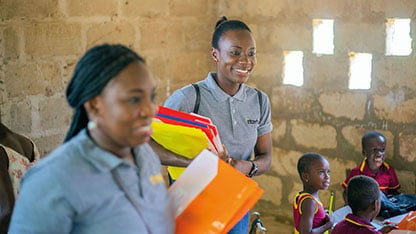At Intertek India, we are passionate about our purpose, striving to make the world a better, safer, and more sustainable place for all, now and for future generations.
Intertek India is committed to being a force for good in the world by bringing quality, safety, and sustainability to life. As part of the company’s Sustainability Excellence agenda and ‘Build Back Ever Better’ approach, we are focused on achieving a positive impact within the communities where we operate, through indirect economic impact and supporting a number of local welfare and socioeconomic development projects across the country.
We believe in Serving Our Communities — Connect and Give Back.
Our CSR arm was started in 2015 to help address the most pressing problems plaguing the country, through projects of education, health, livelihood, skill development, environmental sustainability, and other thematic areas.
We have accelerated our own sustainability performance as well as the development of innovative solutions to help customers deliver their sustainability agendas. We will continue to deliver sustainable value for all our stakeholders, customers, and our communities through sustainable development; leveraging technology and innovation to increase efficiency and productivity with less impact on the environment.
We strongly emphasize Community Welfare as part of Intertek India Private Limited Corporate Social Responsibility (IIPL CSR) by utilising the following drivers for our CSR programmes:
- Education
- Employability and Skill Development
- Health & Sanitation
- Environmental Sustainability
- Poverty Alleviation
In addition to these pillars, we offer aid and assistance for disaster relief and rehabilitation, and also support old homes and orphanages.
Our flagship programs:
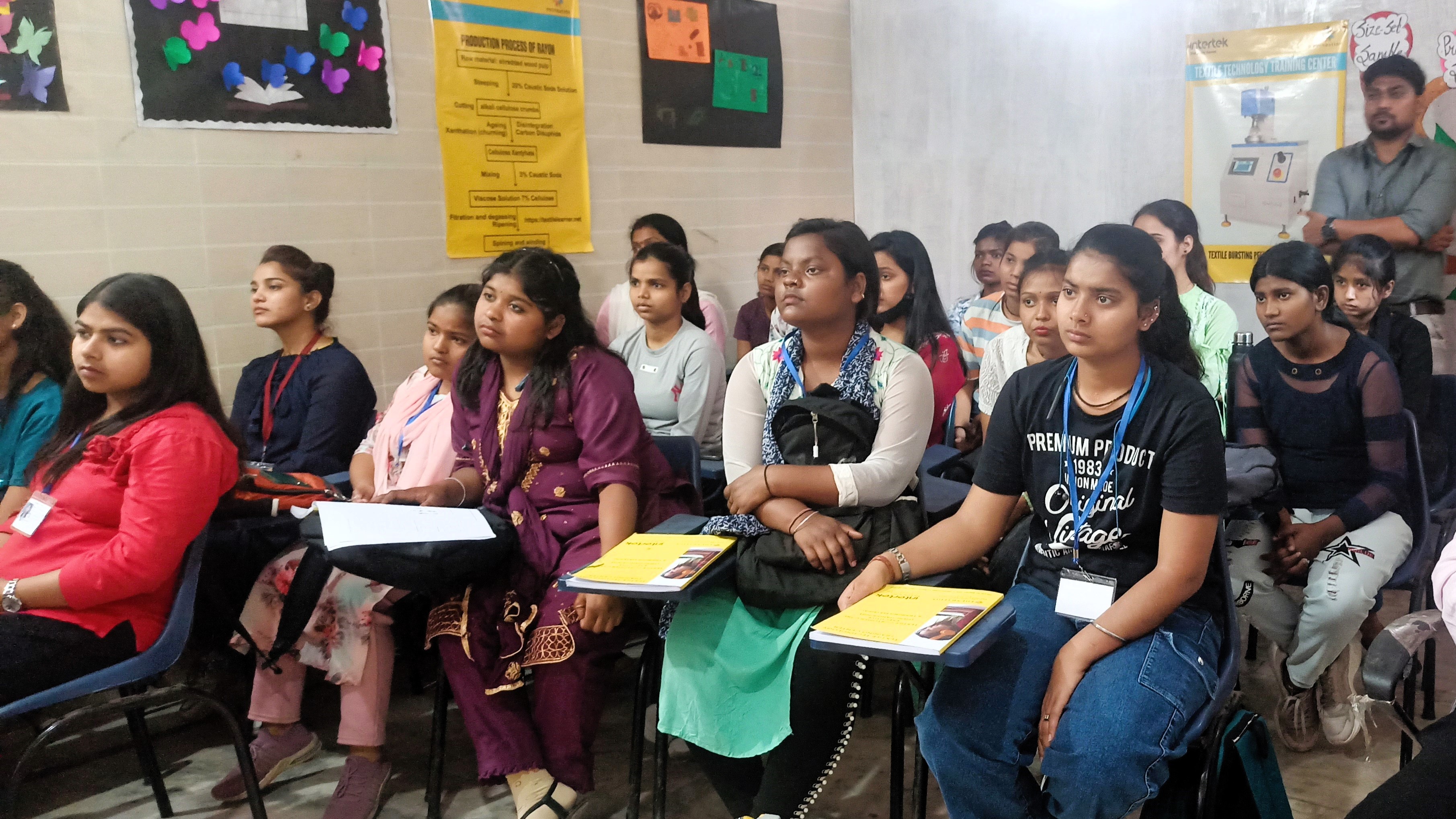
'Setu' Employability-based Skilling
Continuing with our commitment to create a sustainable workforce of the future, Intertek India has scaled up its skilling projects in various locations (Tirupur, Gurugram & Bengaluru). Through Setu (earlier known as T3), a chain of Textile Technology Training Centres in three locations, we have sought to bridge the technical skills gap in the textile testing and quality assurance industry by proviing Skilling, Education, and Training for the Upliftment of beneficiaries.
The SETU program offers free training across locations to over 814 young individuals enrolled in certified courses, preparing them for roles as future lab technicians and merchandisers over a three-year program. So far (as of April’24), 301 students have been trained in Tiruppur alone, with 224 graduates having now successfully secured employment across 109 different textile companies. Currently (as of April’24), 234 students are undergoing training at three locations. This program on an average raises annual family income of the students, when they secure jobs with their added qualification, from GBP 750 to GBP 1500 or more.
The initiative forms an integral part of Intertek’s wider efforts to support the development of the Indian textile industry while simultaneously empowering members of the local population – especially women – to learn new professional skills and access better job opportunities.
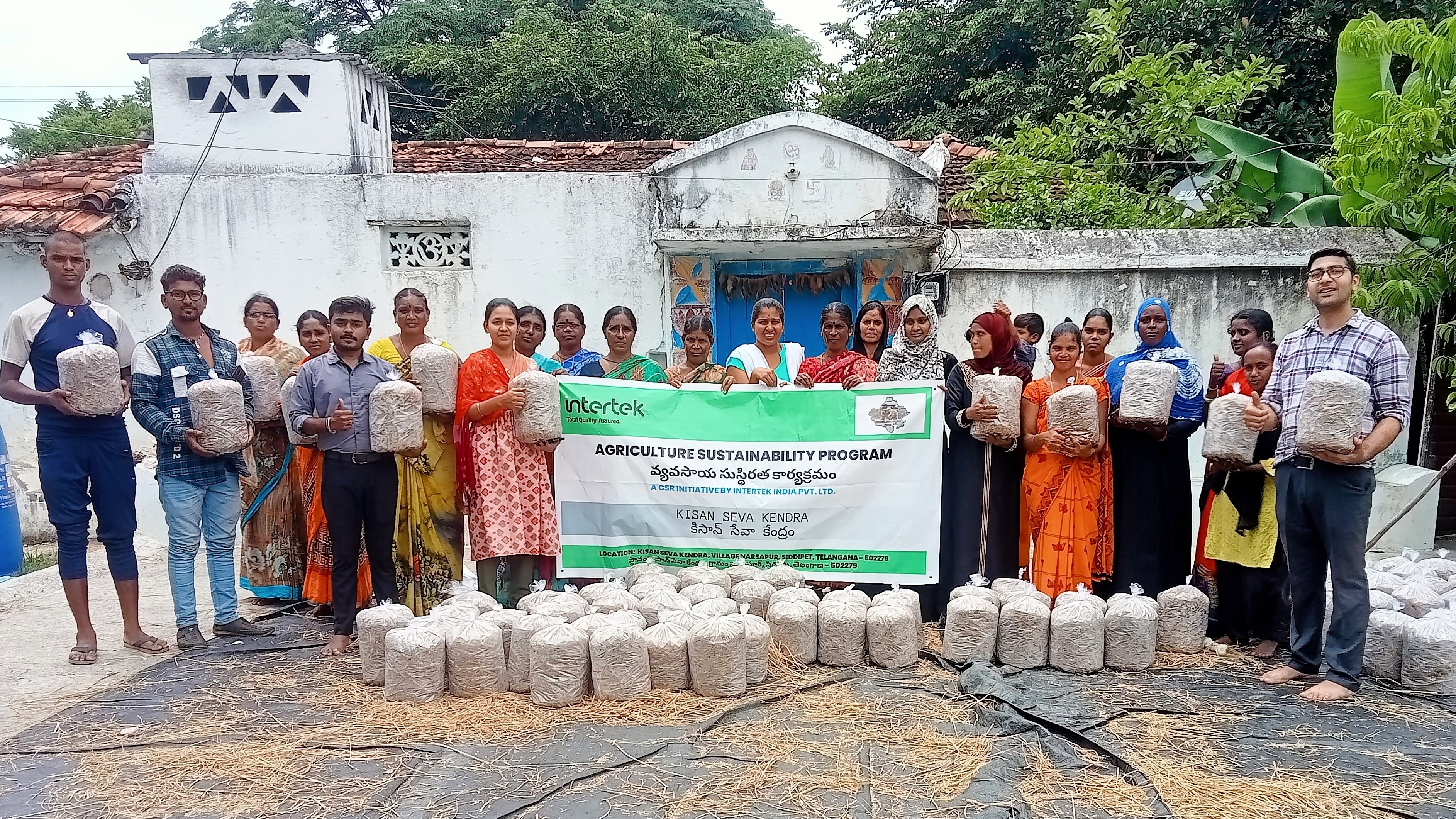
Rural Livelihood Creation
We launched an Agricultural Sustainability project – ‘Planted with Purpose’ in April 2023 - aimed at building the capabilities of 250 marginalized farmers, especially women, in Hyderabad, Telangana. The initiative aims to develop a sustainable economy in the region, by focusing on skill enhancement and activities for sustainable growth, including training for medicinal mushroom cultivation, creation of a Farmer Producer Organization, establishment of proper market linkages, soil testing to optimize crop production, specialized trainings related to vermicomposting, organic farming, livestock management, and microenterprise creation.
In Narspur village, Hyderabad district, women were struggling to maintain a stable livelihood due to limited access to education and employment opportunities. They (and their families) were mostly landless, and their husbands worked as seasonal migrant workers.
This initiative has empowered these women with an alternate income stream, enabling them to cultivate 156 kgs of medicinal mushrooms (as of March’24) in demonstration fields, and sell them at INR 200 per kg. Encouraged by the success, they aspire to broaden their mushroom cultivation to include various seasonal varieties and establish their own microenterprises.
To enhance the impact of these efforts, we have further established a Farmer Producer Organization called Organicoasis.
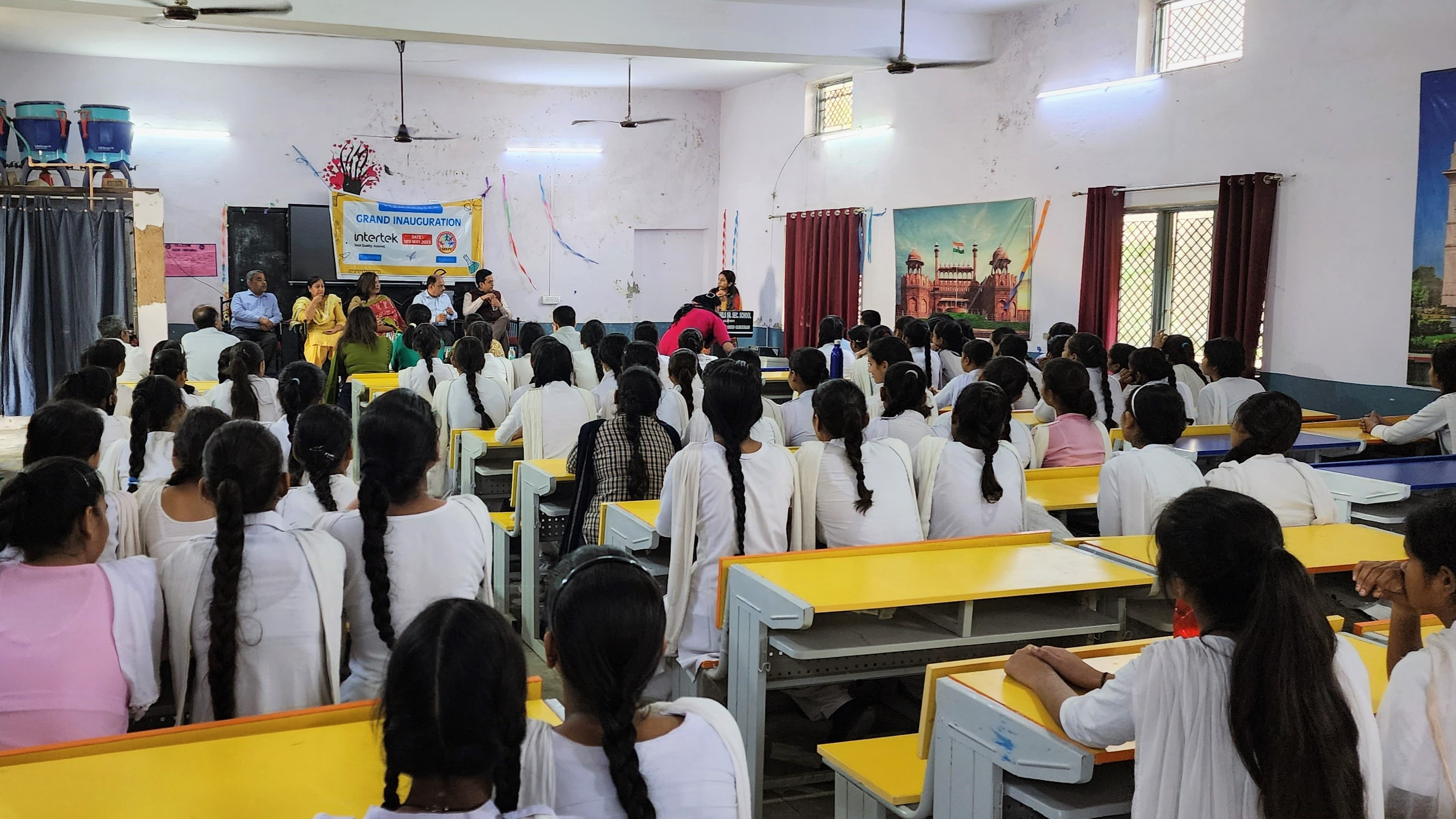
STEM Education
With the increasing demand for STEM professionals, it has become essential to introduce STEM education at an early age. In India, several government initiatives in India, like the National Education Policy (NEP) 2020 are focused towards promoting STEM in schools.
As a science-based organization, we implemented the ‘Design for Good -STEM Education’ project in April 2023 to promote STEM (Science, Technology, Engineering & Mathematics) education across Government Schools in rural Gurugram and Mumbai. This initiative will enable more than 40,000 young minds over the course of the project to gain a practical understanding of scientific concepts and develop critical thinking and cognitive abilities.
The majority of students in these school’s hail from low-income families and are first-generation learners. The program is a great opportunity for them to access quality STEM education free of cost and develop skills relevant to their professional growth.
The initiative is not limited to infrastructure upgrade and the building of STEM labs. Training and capacity building of teachers is also done in activity-based teaching so teachers can use innovative and engaging methods of instruction.
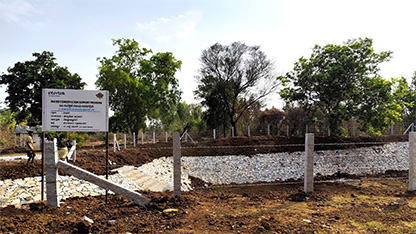
Water Conservation
Karnataka has the second largest arid zone area in India, with 79% of the state area drought prone. By promoting water conservation and reducing wastage, watersheds can provide a lifeline to communities in drought-prone areas.
We adopted a 900 sq.m. water body in Madhure village of Bengaluru district for redevelopment and upkeep along with awareness building and mobilisation of the community who benefitted from the water body. This project aim was to promote groundwater recharge and to maintain, conserve, and improve the watershed’s land for more efficient and long-term productivity.
Water storage capacity of the pond was increased from 10 Lakh litres to 31 lakh litres benefitting around 700 people directly and 3000 people over period of three years. During the monsoon, the pond can now efficiently collect excess runoff, serving as a vital reservoir for supplemental crop irrigation. It has also become a safe drinking water source for cattle during periods of drought.
Well-managed watersheds can enhance the quality of available water by filtering pollutants and preventing soil erosion, thus reducing the risks of water contamination and depletion.
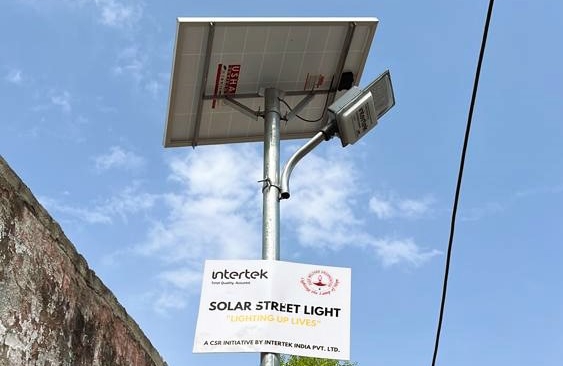
Solar Streetlights
In April 2023, under our Environment and Sustainability pillar, we implemented the ‘Lighting Up Lives’ Solar Streetlight Installation Project across remote villages in Gurugram and Tirupur impacting lives of 64,000 people by ending light poverty.
Although the local community here has access to electricity, it generally does not have any outdoor streetlight facilities. Where movement in the dark lanes earlier used to be challenging and risk-prone, these solar streetlights have brought safety, sustainability, and a better quality of life.
In addition, the use of solar energy removes the need to borrow power from the local electricity grid.
The program has led to yearly power reduction of 29,160 Kw, contributing to our net zero goal.
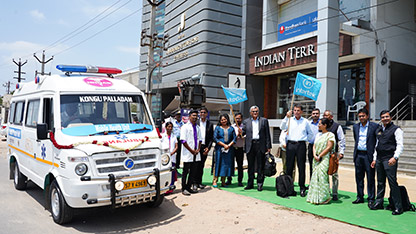
'Arogya' Health & Safety
In October 2023, we flagged off Arogya, a community health project aimed at providing preventive and curative healthcare to more than 35,000 beneficiaries across 20 villages in the greater Tiruppur district, especially in remote and inaccessible parts where access to basic health infrastructure is often limited.
The Arogya mobile healthcare unit (MHU) comes equipped with general OPD services, equipment, and medicines necessary for early diagnosis and effective patient management. The unit is designed to offer inclusive and affordable basic healthcare in addition to a reliable doctor-patient follow-up system, ensuring timely treatment for those in need. It also helps enhance local awareness of best practices around health and hygiene with the aim of combating the prevalence of diseases and other ailments in the region.
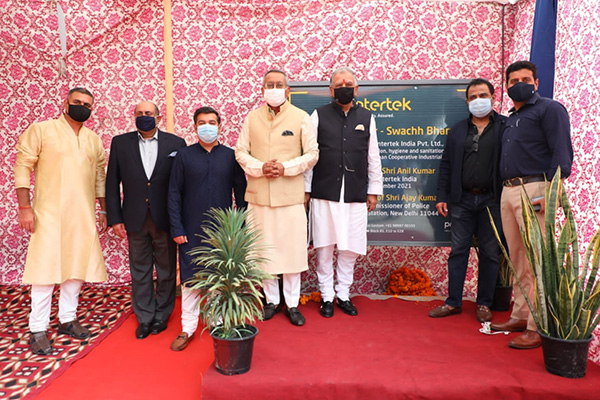
Health and Hygiene
Swachh Parisar – Swachh Bharat
Intertek India has run a major hygiene and sanitation improvement project in the areas of Mohan Cooperative Industrial Estate in a phased manner since 2015. We have established a local drainage system as well as a waste disposal mechanism to improve sanitation facilities, improved hygiene and health standards through paving of roads and filling of potholes, and expanded the area's green cover with tree plantations.
Clean and paved roads, better hygiene and sanitation standards, safety and comfort of access, and a marked development in the quality of life in the area have made a noticeable positive difference for our stakeholders and contributed to community development and upkeep.
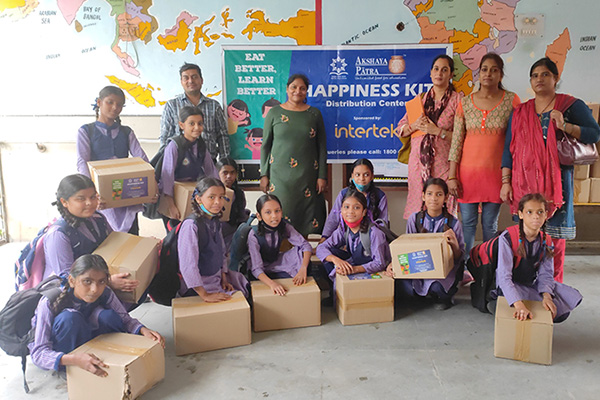
Poverty Alleviation
Happiness Kit Distribution
The Happiness Kit Distribution Program aims to bridge the nutrition gap in school-going children through the provision of mid-day meals, hygiene facilities, and learning tools in Government schools. The immunity, hygiene, and educational supplies are distributed to the Midday Meal beneficiaries through the ‘Happiness Box’ program at school premises.
The main objective of the program is to ensure nutritious meals for the children, boost their immunity and health, cover their basic hygiene needs, and ensure their continuous learning, particularly following the COVID crisis. Intertek India successfully distributed 32010 Happiness Kits to Government school children in Delhi during the year 2020-2023.
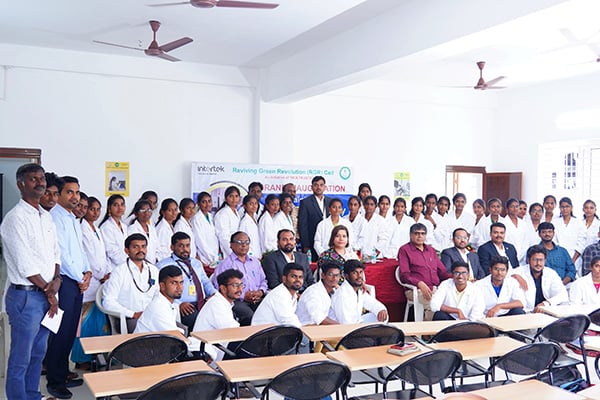
Education
Employability & Skill Development Program
Nearly 65% of India's youth is unemployed, a number that can be largely attributed to a widening technical skill gap in the labour force. The underprivileged youth does not have access to training and skill-building opportunities, especially in job readiness skills and TIC-specific technical skills. Intertek India aims to reduce this immense skill gap through skill development program implemented across the country.
Our Tirupur Skill Development Project is a unique endeavour to enhance employability as well as employment in the youth population. The project is being implemented in a phased manner over a period of 3 years. It will help underprivileged youth, especially women, to access better job opportunities and empower them to break out of the cycle of poverty. 600+ targeted beneficiaries will be certified as either Lab Assistants (Textile & Quality Analysis), Chemists, Senior Chemists, or Customer Coordinator Executives. Training is being provided free of cost in all trades, as these are the sectors that face a dearth of skilled workers.
The project is undertaken here in partnership with Reviving Green Revolution (RGR) Cell, a Tata Trusts initiative, which is known for imparting vocational training in Tamil Nadu. All successful candidates who pass the final assessment will be provided with a joint certification.

